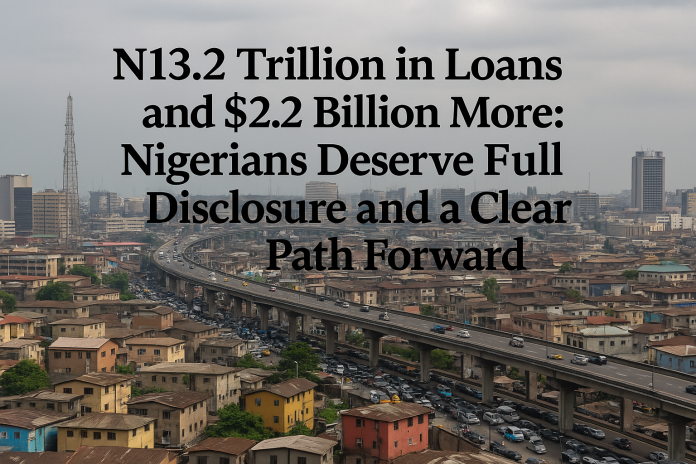By Bukar Mohammed
In a time when nations are redefining governance and restoring public trust, Nigeria can no longer afford to operate in silence. With over ₦13.2 trillion in loans already on record—and an additional $2.2 billion proposed—Nigerians deserve more than vague assurances. They deserve transparency, accountability, and a strategic roadmap.
This is not an emotional plea. It is a national necessity.
Despite receiving substantial allocations from the Federation Account Allocation Committee (FAAC), the Federal Government continues to depend heavily on borrowing—yet there is little to show for it in real infrastructure, quality healthcare, functional education, reliable power, or economic transformation. Meanwhile, our mounting debt threatens to cripple the very foundation of our economy.
Nigeria is not a banana republic, contrary to the derogatory references made by separatist voices like Nnamdi Kanu. We are a nation of brilliant, educated, and entrepreneurial people. Unfortunately, our collective energy is too often consumed by tribalism, religious division, and ethnic chauvinism, rather than channeled into constructive civic engagement. This must change.
We must begin to ask the right questions and demand honest answers from those in power:
-
What happened to the ₦13.2 trillion already borrowed?
-
Why do we need another $2.2 billion loan—and under what terms?
-
Where are the audited reports on the use of past loans and repatriated assets?
-
What is the Nigerian National Petroleum Company (NNPC) doing with the billions generated from crude oil sales?
-
How many barrels of oil do we produce daily, and how much revenue is realized each month?
A responsible government, observing the bold reforms and transparency championed by leaders like Captain Ibrahim Traoré of Burkina Faso, would understand the urgency of full public disclosure. We must know—clearly and publicly—how much oil is produced, how much is sold, and what is done with the revenue. Nigeria must reset its fiscal culture, starting now, before our unrestrained appetite for loans consumes our future.
But asking tough questions is not enough. We must also provide bold solutions.
One such solution is a conditional amnesty program for Nigerians who have looted or illicitly moved funds abroad. This could serve as a sustainable alternative to continued borrowing. Under strict regulatory oversight, repatriated funds could be redirected into critical sectors, with incentives such as:
-
Tax amnesty and breaks for five years
-
Mandatory investment in high-impact industries such as:
-
Electricity and alternative energy (e.g., local manufacturing of solar panels and transformers)
-
Agro-processing and manufacturing
-
Tech and digital infrastructure
-
This initiative would not only drive industrialization but also reduce the government’s dependence on external loans while building investor confidence and national resilience.
Our call is simple but urgent:
-
If Nigeria must borrow, it must also account.
-
If Nigeria must rise, it must also reform.
-
If Nigeria must heal, we must start now—with the truth.
Let every Nigerian, regardless of tribe, religion, or region, rise above division and demand a nation that is accountable, inclusive, and future-ready. This is not about politics—it is about posterity.
Bukar Mohammed is a public affairs analyst based in Kano.
Share your story or advertise with us: Whatsapp: +2347068606071 Email: info@newspotng.com

















